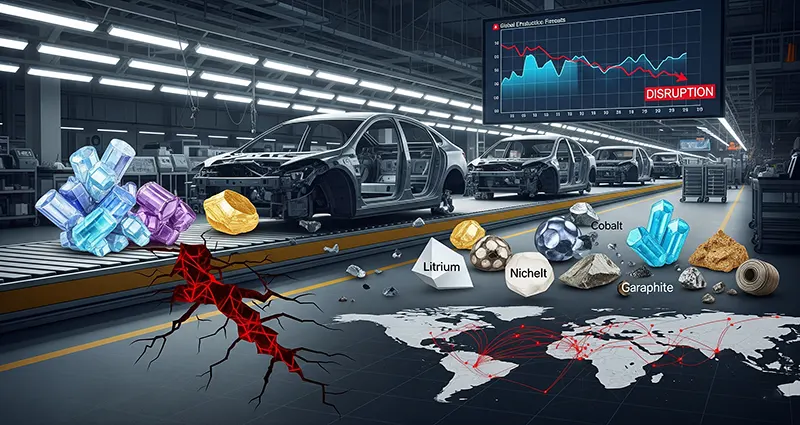The global transition to electric vehicles (EVs) is accelerating rapidly as countries strive to reduce carbon emissions and combat climate change. Central to this electrification revolution is the supply of critical minerals—such as lithium, cobalt, nickel, and rare earth elements—that are essential for manufacturing EV batteries and components. However, disruptions in the supply chain of these critical minerals pose significant challenges to global EV production, with far-reaching economic, environmental, and geopolitical implications.
Critical Minerals: The Backbone of EV Manufacturing
Electric vehicles rely heavily on batteries that use specific minerals to achieve energy density, longevity, and performance. Lithium-ion batteries, the predominant technology in EVs, require lithium for energy storage, cobalt for stability, and nickel to enhance energy capacity. Rare earth elements like neodymium and dysprosium are crucial for manufacturing powerful magnets used in EV motors. The limited geographical availability of these minerals and concentrated production in a few countries make the supply chain inherently vulnerable to disruptions.
Causes of Supply Chain Disruptions
Several factors contribute to interruptions in the critical mineral supply chain:
- Geopolitical Tensions: Major mineral-producing countries may impose export restrictions or trade barriers due to political conflicts, diplomatic disputes, or national security considerations.
- Resource Nationalism: Countries rich in critical minerals may prioritize domestic needs or state-controlled industries, reducing export volumes to foreign manufacturers.
- Environmental and Social Concerns: Mining operations can face delays or shutdowns owing to environmental regulations, community opposition, or ethical concerns related to labor practices.
- Pandemics and Global Crises: Events like the COVID-19 pandemic disrupt mining operations, logistics, and labor availability, causing supply shortages and delays.
- Infrastructure and Investment Gaps: Insufficient investment in mining infrastructure and processing facilities limits production capacity and adaptability to demand spikes.
Consequences for Global EV Production
Supply chain disruptions in critical minerals impact EV production in multiple ways:
- Increased Production Costs: Scarcity of key minerals drives up raw material prices, making EV manufacturing more expensive and potentially delaying cost parity with internal combustion vehicles.
- Manufacturing Delays: Limited availability of battery components slows down assembly lines, leading to delays in EV deliveries and reduced market penetration.
- Innovation Challenges: Uncertainty in mineral supply may hinder research and development efforts aimed at improving battery technology and vehicle performance.
- Supply Chain Resilience Strain: Automakers and suppliers must invest in diversifying sources, stockpiling materials, or developing recycling processes, adding complexity and cost.
Global Response and Mitigation Strategies
To address these challenges, stakeholders across industries and governments are implementing several strategies:
- Diversification of Supply: Expanding mining operations to new regions and developing alternative suppliers reduces dependency on single countries or sources.
- Recycling and Circular Economy: Enhancing battery recycling technologies recovers valuable minerals, lessening the demand for virgin resources.
- Material Substitution: Research into batteries that use less or no critical minerals, such as solid-state or sodium-ion batteries, seeks to reduce vulnerability.
- Strategic Reserves: Some governments are establishing stockpiles of essential minerals to buffer against supply shocks.
- International Cooperation: Collaborative frameworks and trade agreements aim to stabilize markets and ensure responsible sourcing.
The impact of critical mineral supply chain disruptions on global EV production is a pressing challenge that underscores the complexity of transitioning to sustainable transportation. Ensuring a stable, ethical, and diversified supply of these minerals is vital for the continued growth of the EV market and achievement of climate goals. Through coordinated efforts in innovation, policy, and resource management, the industry can mitigate risks and pave the way for a resilient and electrified future in mobility.





